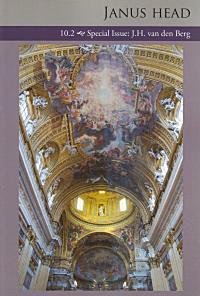 Janus Head Janus Head
10.2
Special Issue
J.H. van den Berg

Beyond Time
New & Selected Work
1977 - 2007
Robert Gibbons
 The Age of Briggs & Stratton The Age of Briggs & Stratton
Peter Culley
|
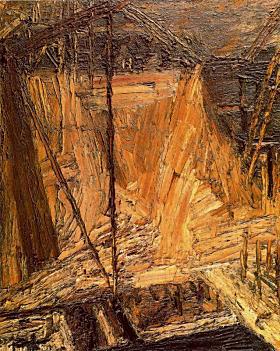
Frank Auerbach
b. April 29, 1931
_______________________
Global justice and the renewal of critical theory
A dialogue with Nancy Fraser
eurozine
"Nancy Fraser explains how the shift from redistribution to recognition undertaken by political movements during the 1990s forms part of the "post-socialist condition". The fall of the Soviet Union, she argues, not only brought the end of communism, but also sucked the energy out of most movements with social-egalitarian aspirations. Yet in an era of globalization, the change could also be seen as one of "frame". Campaigners for redistribution are no longer constrained by the borders of the nation-state, and concentrate their efforts increasingly on inequalities between, rather than within, nations. Transnational activism is where Fraser now hopes challenges to the "post-socialist" common sense will emerge."
_______________________

Tango with Cows
Velimir Khlebnikov
1914 Vasily Kamensky's wikipedia entry
courtesy of language hat
Collected Works of Velimir Khlebnikov: Letters and theoretical writings
Translated by Velimir Khlebnikov, Paul Schmidt
google books
.....................................................
Tango with Cows: Book Art of the Russian Avant-Garde 1910-1917
the Getty Research Institute
PennSound is especially pleased to present a remarkable archive of audio files accompanying the exhibition
PennSound has been working in collaboration with the Getty Research Institute to present this remarkable collection of historical and contemporary transrational poetry, centered on an exhibition of Russian Futurist book art held at the Getty earlier this year. The exhibition's title "Tango with Cows" taken from a poem by Vasily Kamensky, points to the sense of hilarity and irreverence you'll hear in these startlingly original 'beyonsense' poems. Our page of recordings compliments the extensive media collected online at the Getty's website. There, you can find programs, essays, video footage, full scans of the Futurist books, and even a fully interactive slideshow of key books from the exhibition!
Our archive of sound recordings comes in two parts: first, Tango with Cows features Oleg Minin's bilingual readings of essential poems found in book art projects from poets such as Alexei Kruchenykh, Velimir Khlebnikov, and Pavel Filonov. By reading from the Russian before the accompanying English translation, Minin offers listeners the pleasure of sound before recognition an ideal situation for the revolutionary poetics on display here.
However, the real highlight of this great resource sounds from the second half: we're pleased to present high quality recordings of Explodity: An Evening of Transrational Sound Poetry held on February 4th, 2009. This blockbuster reading casts the zaum' poetries of Khlebnikov and Kruchenykh in the parallel light of historic and contemporary sound poetry, as presented by Christian Bok and Steve McCaffery. After virtuoso performances of English translations of historical Russian poems, Bok and McCaffery present personal selections from the history of sound poetry alongside their own original compositions. On the short list are works by Aristophanes, Raoul Hausmann, F.T. Marinetti, Hugo Ball, Kurt Schwitters, and R. Murray Schafer, just to mention a few.
_______________________
Poemulations: Emily Dickinson, James Metcalfe & Chum Frink
Mike Chasar
Poetry & Popular Culture
"There is another sky, Ever serene and fair, and there is another sun-shine, tho it be darkness there—Never mind faded forests, Austin, never mind silent fields—Here is a little forest, whose leaf is ever green; here is a brighter garden, where not a frost has been; in its unfading flowers I hear the bright bee hum; prithee, my brother, into my garden come!"
- Emily Dickinson, letter to her brother
(....)
The history of "There is another sky" raises a number of questions for Jackson about when the poem in fact became a poem. "Was it never ... a poem," she wonders at one point, "since it was never written as verse? Was it always ... a poem, because it could always have been read as verse? Or was it only ... a poem after it was printed as verse?" Later on, she continues with related questions: "In view of what definition of poetry would Dickinson's brother have understood the end of his sister's letter to him as a poem? Did it only become a poem once it left his hands as a letter? According to what definition of lyric poetry did Dickinson's editor ... understand a lyric poem to be if it was not the passage at the end of the 1851 letter? Can a text not intended as a lyric become one? Can a text once read as a lyric be unread? If so, then what is—or what was—a lyric?"
- Virginia Jackson, Dickinson's Misery: A Theory of Lyric Reading
(....)
Dickinson, as Jackson and other scholars have observed, collected all manner of artifacts from print culture of her time, sending clippings to friends, composing on scraps of paper, and perhaps even incorporating this material into the surround or various "backstories" of her poems. How possible is it, then, that Dickinson was in fact writing a prose-poetry, newspaper-style lyric or "poemulation" to her brother Austin in October of 1851? Very possible, say we in the Poetry & Popular Culture office. Very possible indeed. ...(more)
_______________________
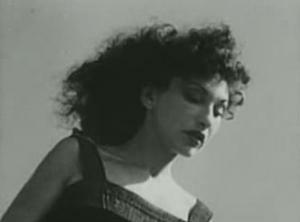
Maya Deren
(April 29, 1917 – October 13, 1961) Video
Maya Deren and the American avant-garde
Bill Nichols, Maya Deren
google books _______________________
The Loire Delta
Tomaž Šalamun
translated by Brian Henry
I have more zest than a boat pushing
the sea aside, because it pushes it evenly.
I enjoy spasmodically. As if the sun would
be put out and be born again. For this is worth
getting addicted. To be able to be dragged out,
to be whipped as a kind of Christ. But engineers
who made the paw to the bridge, the girders,
don’t remain in history. They lack spasmodicality.
If my car would be thrown from the bridge
over Loire, or at least would be finely shaken,
I’d remember it. The hand’s move is always
the first one. And the opening of your little
mouth: yours, yours, yours, is always
the first thing, no matter the age.
Tomaž Šalamun - Three poems
translated by Brian Henry
Woods and Chalices
Tomaž Šalamun
Translated by Tomaž Šalamun, Brian Henry google booksTomaž Šalamun at Poetry International Web and the Poetry Foundation
_______________________
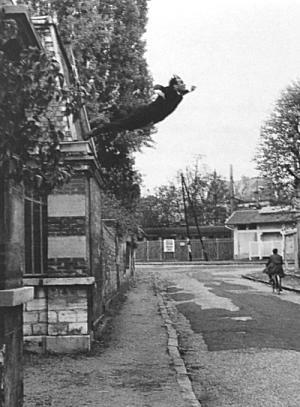
Leap into the Void
Yves Klein
1928 - 1962
_______________________
Through a glass, darkly: photography and cultural memory
Alan Trachtenberg
Social Research , Spring, 2008
As represented in Blade Runner the kind of picture known as "photograph" (written in light, literally) conveys the traditional association of memory and history with photography. Today that simple idea of a light-based transparent nexus between photograph and a determinate past is undergoing radical reappraisal. The digital revolution, as probably everybody on earth now realizes, has eroded the old confidence in that transparency. We and our comfortably reliable old paper photographs now live alongside the all-pervasive digital method of producing replicas, virtual replicants, of the old photographic image without the old apparatus of lenses and film, or indeed of anything we need believe was ever to be photographed.
If the nineteenth century invented photography, the late-twentieth-century began to disinvent it. We've learned how machines can be made to mimic or replicate human ways of seeing, and with robotic modes of mass production cheap versions of replication devices are available to everyone on earth. It has been a quiet cultural revolution of incalculable consequence. Everywhere you look you see people with these slips of metal and plastic instruments not peering at the world through a view finder but looking for the world at or on the back of the new-style "camera" (another sly metaphor) with its screen or monitor. The wonder is that people have adjusted to this new phenomenon so easily, as if without a grunt or ripple, perhaps with minor annoyance at the baffling array of choices among digital settings that soon gives way to happy complacence. But think of what happens. It is as if the world given to the eyesight no longer lies in front of the instrument of seeing but on its backside, already processed into image: a digital version of seeing through a glass, darkly.
The new photography elides so well with the old, and digital image-making couples so smoothly with laptops and desktops, that snapshot memory has taken an amazingly radical turn. Most users of these compact boxes rigged with hi-tech switches and chips may barely notice the difference. But difference is real and stunning. It teaches a high-stake lesson about our lingering assumptions regarding photographs and memory. People seem still to believe that if it looks like a photo, it must be one of the old kind, a record of something that truly happened. Post-photography undermines that glib assumption. Mitchell's image of a flood hardly exaggerates. With electronic image-making having effectively taken over and computer memory established as the matrix of images-of-the-world, we are already well within the era of post-photography.(....)
There is a force common to Kierkegaard and Nietzsche. (Peguy would have to be added in order to form the triptych of priest, Antichrist and Catholic. Each of the three, in his own way, makes repetition not only a power peculiar to language and thought, a superior pathos and pathology, but also the fundamental category of a philosophy of the future. To each corresponds a Testament as well as a Theatre, a conception of the theatre, and a hero of repetition as a principal character in this theatre: Job-Abraham, Dionysus-Zarathustra, Joan of Arc-Clio). What separates them is considerable, evident and well-known. But nothing can hide this prodigious encounter in relation to a philosophy of repetition: they oppose repetition to all forms of generality. Nor do they take the word 'repetition' in a metaphorical sense: on the contrary, they have a way of taking it literally and of introducing it into their style....(more)
_______________________

.....................................................
"Enjoy Glenn Gould, the master of enabling us to ignore the times when we fall – out of grace, or into oblivion – and appreciate the times when we burn for others, and let others burn for us."
Re-masterCamelia Elias FRAG/MENTS
Some years ago I taught some sessions in a class on Canadian cross-aesthetics. Three of my colleagues at Aalborg U and I went from philosophy, especially Charles Taylor, through the singer Leonard Cohen, the novelist Margaret Laurence, to other types of artistic manifestations. The class was a joy, especially as I had the privilege to close with Glenn Gould playing Bach. Now I can’t remember what I said, between showing enthusiasm for Gould’s own enthusiasm for Bach’s mathematical compositions and my own fascination with the cross between numbers and noumena, but I do remember that one of the things I emphasized was the fact that what made Gould’s performances so über brilliant and without equal is his ability to approach the musical subject without prejudice. In terms of method, he never approached a score without first learning it by heart, then thinking about it long and hard, and then playing it not on the piano, but in his head, as his fingers would tap on any board – without the keys. Such reverence inspires me....(more)
The Glenn Gould Archive
Conversations with Glenn Gould
Glenn Gould, Jonathan Cott
google books
The Blank Space
Glenn Gould, Russia, Finland And The North
Sergei Medvedev
ctheory
_______________________

A Windy Day
David Cox
Born on 29 April 1783
_______________________
The Man I Respected
Tomaž Šalamun
translated from Slovenian by Brian Henry
When I returned from Mexico, I looked like
death. My mouth collapsed
and disintegrated. I was paying a penalty
for my sins, my palate had dissolved.
I could touch my brain with my tongue.
It was painful, horrible and sweet.
While Svetozar sat outside in the waiting room,
I tore down the instrument case.
No, I am not being precise: he left the office
before me, I only suspected who he was, I didn’t even
know him. When I sat in the chair,
my energy tore down the instrument case.
To pass from world to world
means an earthquake. Yesterday he died.
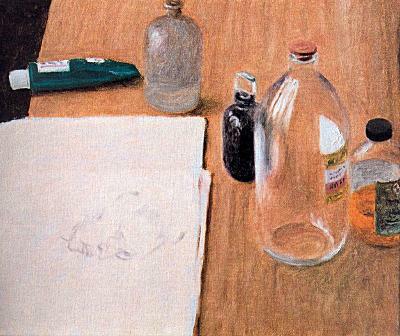
Ink and Solvents
Avigdor Arikha
b. April 28, 1929
_______________________
Eternity No More: Walter Benjamin on the Eternal Return
Tyrus Miller
in Given World and Time: Temporalities in Context, edited by Tyrus Miller
courtesy of Robin Tremblay-McGaw
X Poetics
"Men of the nineteenth century, the hour of our apparitions is fixed forever,
and always brings us back to the very same ones."--Blanqui, 1872
On January 6, 1938, Walter Benjamin wrote to Max Horkheimer from San Remo to report on a remarkable development in his thinking about his Baudelaire studies and about the larger framework of the Passagenwerk, Benjamin's decade-long historical research about 19th-century Paris, a project that he described as an "Urgeschichte der Moderne" (an archaic history of modernity). The occasion of this development was his encounter with a largely forgotten text by the famous insurrectionist Auguste Blanqui, entitled L'éternité par les astres (Eternity According to the Stars). This short book comprised a set of cosmological speculations written in prison by the old revolutionary near the end of his life, and coupled arguments from the popular science of Blanqui's day with a remarkable vision of infinite repetitions of the same in an indefinite series of parallel worlds. Here is Benjamin's report to Horkheimer:
In the last weeks I have made a strange find that will decisively influence the work: I came upon the text, Blanqui's last, which he wrote in his final prison,in the fortress of Taureau. It is a cosmological speculation. . . .and is, as far as I can tell, till now as good as unknown. . . . Admittedly,at first glance the text is tasteless and banal. Whereas what constitutes its main portion are the clumsy meditations of an autodidact, these prepare for a speculation about the universe that could be provided by no one lesser than this revolutionary. If Hell is a theological object, one could call these speculations infernal. The world view that Blanqui sketches here, while taking its data from the mechanistic natural sciences of his day, is in fact infernal--but is at the same time, in the shape of something natural, the complement of the social order that Blanqui must have recognized in the evening of his life to be the victor. What is astonishing is that this sketch is completely without irony. It represents an unconditional surrender,but at the same time the most terrible lament against a society that projects this images of the cosmos against the sky. The piece has as its theme, the eternal recurrence, the most remarkable relation to Nietzsche; and a more hidden and deeper one to Baudelaire, with whom in a few of its magnificent points it resonates almost word-for-word.
Although this was only two years from the close of Benjamin's own defeated life, this seemingly minor discovery of a truly marginal text of Blanqui crystallized a whole new set of motives in the Passagenwerk studies and seemed to offer Benjamin a conceptual hinge for the juncture of modernity and myth he intuited in the culture of 19th-century Paris. In fact, in the final, 1939 version of his exposé of the Passagenwerk he granted the last word--in his text and about the nineteenth century--to the messengers of the eternal recurrence. In his final paragraph, following a quote from Blanqui's L'eternité par les astres, Benjamin concludes:
The century was incapable of responding to the new technological possibilities with a new social order. That is why the last word was left to the errant negotiators between old and new who are at the heart of these phantasmagorias. The world dominated by its phantasmagorias--this, to make use of Baudelaire's term, is "modernity." Blanqui's vision has the entire universe entering the modernity of which Baudelaire's seven old men are the heralds. In the end, Blanqui views novelty as an attribute of all that is under sentence of damnation. Likewise in Ciel et enfer, a vaudeville piece that slightly predates the book: in this piece the torments of hell figure as the latest novelty of all time, as "pains eternal and always new." The people of the nineteenth century, whom Blanqui addresses as if they were apparitions, are natives of this region.
...(more)
_______________________

Dicta and contradicta
Karl Kraus
(April 28, 1874 – June 12, 1936)
Translated by Jonathan McVity
google books
Selected short writings
Karl Kraus, Elias Canetti, Dirck Linck, Hermann Broch, Robert Walser
google books Digitalized Edition of Die Fackel
free subscription req'd
Karl Kraus and the critics
Harry Zohn
google books _______________________
The Way to the River
W. S. Merwin
The way to the river leads past the names of
Ash the sleeves the wreaths of hinges
Through the song of the bandage vendor
I lay your name by my voice
As I go
The way to the river leads past the late
Doors and the games of the children born looking backwards
They play that they are broken glass
The numbers wait in the halls and the clouds
Call
From windows
They play that they are old they are putting the horizon
Into baskets they are escaping they are
Hiding
I step over the sleepers the fires the calendars
My voice turns to you
I go past the juggler’s condemned building the hollow
Windows gallery
Of invisible presidents the same motion in them all
In a parked cab by the sealed wall the hats are playing
Sort of poker with somebody’s
Old snapshots game I don’t understand they lose
The rivers one
After the other I begin to know where I am
I am home
Be here the flies from the house of the mapmaker
Walk on our letters I can tell
And the days hang medals between us
I have lit our room with a glove of yours be
Here I turn
To your name and the hour remembers
Its one word
Now
Be here what can we
Do for the dead the footsteps full of money
I offer you what I have my
Poverty
To the city of wires I have brought home a handful
Of water I walk slowly
In front of me they are building the empty
Ages I see them reflected not for long
Be here I am no longer ashamed of time it is too brief its hands
Have no names
I have passed it I know
Oh Necessity you with the face you with
All the faces
This is written on the back of everything
But we
Will read it together
_______________________
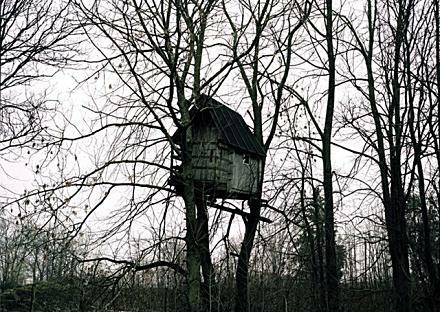
Stefanie Pluta
_______________________
City of Death
Liao Yiwu
translated by Michael Day
And now let us enter the City of Death.
Don’t ask stupid questions like who Allah Fahweh is, when he died, or what the relationship between the bull, god and the people is. If you enter early into the year 6891 and discover your true “home”, if you are brutally lashed to the wheel of time --- turning head over feet hitting the ground, whatever you do, don't cry out in despair: This is the city of death, no one will save you.
Future, present, past; past, present future --- the environment where you exist has changed completely. Who knows when history has it’s beginning? You think some names sound familiar: Jiang He, Bei Dao, Gu Cheng, Zhang Chunqiao, Li Weidong, and so on --- naturally you only remember the era in which you lived. Your deepest overall impressions are always of the Chinese faction fight that broke out in 1966. Fluttering ranks of red cloth incited all to struggle against each other, to hunt down and slaughter the bull of illusion. Have you ever heard the string of crisp popping sounds made when gonads are smashed?
That sound kept me terrorized for thousands of years. You have to believe me, believe the lonely craftsman who built the . I can recite my name, age and place of birth fairly accurately to you to prove that I have never gone mad.
I can fairly accurately knock on the door of each acquaintance and little by little insinuate my solitude into their bodies, fomenting the madness hidden by the soul. No matter how pretty the mask, the force of instinct flows on forever from a far-off source. The task of art is to resist convention, to build an opposite world on top of the strict, scientific order, to satisfy absolutely free, frenzied imaginings, to let the material and spiritual reach relative balance.
(....)
I can just stare at the worn threshold beneath the hill of the rock garden opposite
It seems so like my old home’s
At the edge of the stairs to my childhood
an old woman sits north facing south
Sadly she plucks out a tongue the size of an egg-plant
she gazes fixedly by the light of the moon
Carved on it are your sins
and the history of a famous city
When she stuffs it hack in her mouth
from beyond the high walls comes the poet’s wild song
the day is breaking
...(more) The Chinese language text [.doc]
Introduction to Liao Yiwu
Michael Day
Digital Archive For Chinese Studies: Poetry
University of Heidelberg's Digital Archive
_______________________
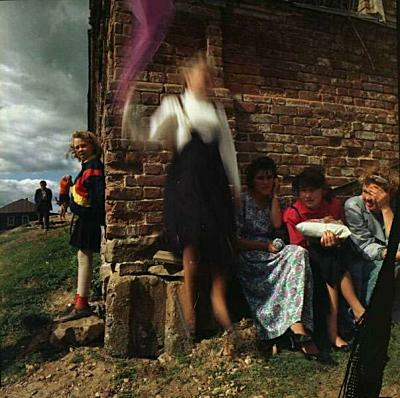
Sergey Chilikov
1 2
_______________________
Language
W. S. Merwin
Certain words now in our knowledge we will not use again, and we will never forget them. We need them. Like the back of the picture. Like our marrow, and the color in our veins. We shine the lantern of our sleep on them, to make sure, and there they are, trembling already for the day of witness. They will be buried with us, and rise with the rest.
_______________________

Stefanie Pluta
_______________________
The Source
W.S. Merwin
There in the fringe of trees between
the upper field and the edge of the one
below it that runs above the valley
one time I heard in the early
days of summer the clear ringing
six notes that I knew were the opening
of the Fingal's Cave Overture
I heard them again and again that year
and the next summer and the year
afterward those six descending
notes the same for all the changing
in my own life since the last time
I had heard them fall past me from
the bright air in the morning of a bird
and I believed that what I had heard
would always be there if I came again
to be overtaken by that season
in that place after the winter
and I would wonder again whether
Mendelssohn really had heard them somewhere
far to the north that many years ago
looking up from his youth to listen to
those six notes of an ancestor
spilling over from a presence neither
water nor human that led to the cave
in his mind the fluted cliffs and the wave
going out and the falling water
he thought those notes could be the music for
Mendelssohn is gone and Fingal is gone
all but his name for a cave and for one
piece of music and the black-capped warbler
as we called that bird that I remember
singing there those notes descending
from the age of the ice dripping
I have not heard again this year can it
be gone then will I not hear it
from now on will the overture begin
for a time and all those who listen
feel that falling in them but as always
without knowing what they recognize
_______________________
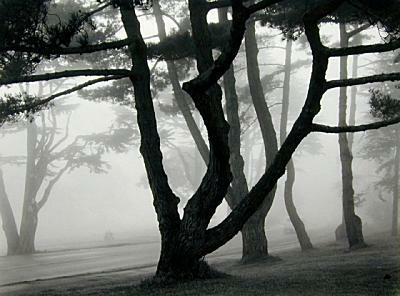
Lincoln Park, San Francisco
Jack Welpott
1923 - 2007
1 2

photo - mw
_______________________
from
Where Is the House of My Friend?
Tom Clark
(after Sorab Sepehri)
(....)
Continue beyond the end
of the first part of your life
and then turn again
take two steps
toward a flower that grows alone
at the foot of the fountain
of the story of the earth
stop and you will be swallowed up
by fear transparent as water
In the closeness of the space that flows
something rustles
in one of the surrounding pines
a child has climbed up
to pluck a young bird
from a nest made of light
and you call out to that child
Where is the house of my friend?
...(more)
_______________________

Ralph Eugene Meatyard
_______________________
Bilocated Identities: Taking the Fork in the Road in Against The Day
Nathalie Aghoro
In Against The Day, world peace is at risk as ‘double thinking’ and inner contradictions are disclosed, bringing about global repercussions. National contradictions gradually escalate in the novel, with World War I being an imminent danger, and the instances of bilocation on a personal level could be seen as reflections of social and political unrest spreading over the world. Like small threads weaving through the narrative, multiple heterogeneous forms of doubling appear on the platform of Pynchon’s world and find their common denominator in what is also the title of the central chapter of the novel: bilocations. ... Against The Day celebrates this simultaneousness of alternatives by giving its characters the possibility of multiple, contradictory experiences, each challenging our beliefs about space, time, and, above all, identity.
... The first part of my paper outlines underlying concepts of identity from the perspective of a world where bilocation is possible. The second part investigates how some characters in the novel tackle the forks in the road when their personal identity is at stake. Due to the diversity and the high number of instances of bilocation in the novel, I will focus on cases of merging, doubling, and parallel identities which use simultaneous migration to avoid particular locations behind hostile lines, or engage in a quest to encompass Pynchon’s latest narrative worlds as a whole. ...(more)
Migration and Mobilityaspeers 2 (2009)
aspeers
graduate journal for American Studies in Europe
_______________________

photo - mw
_______________________
Žižek’s Politics
Jodi Dean
amazon
Žižek’s arguments are compelling because they open up and enliven what has become fixed and stale. The strength of a given conceptualization thus becomes manifest through repeated applications and expressions. A remarkable aspect of this repetition is the way it proceeds through error. That is, Žižek’s applications demonstrate how getting the right answer, getting to truth, is a process of trial and error, or, more precisely, a process of discerning what was missing from our previous way of thinking. If a problem is important enough to think through, then this thinking through will necessarily involve mistakes and omissions. Such mistakes can create new spaces for thought; the errors can incite more thinking, new directions. As my father once told me, anything worth doing is worth doing badly. An idea that is perfect and whole does not provide any space for further thought. Nothing is left to say. Žižek’s mode of thinking, one that draws heavily from the philosopher G. W. F. Hegel, extends out of the insight that such perfect wholes are illusions. There is always something left out, a remainder or excess the very exclusion of which was necessary for the production of the “whole” in the first place. Locating this excess and disrupting the whole, working with negativity—the force of negation—is thus a central component of Žižek’s approach. Žižek’s Politics is also available on google books
Cultural studies & political theory
Jodi Dean
google books
Jodi's blog - I cite
_______________________

Hurley lady raking
On Wisconsin
Mark Brautigam
_______________________
Three Fables
Paul Verhaeghen
Translated from the Dutch by Paul Verhaeghen
words without borders
1 The Tiny Bones
She wrote the perfect sentence.
It was not crafted; it tumbled freely from the heavens, straight into her head.
She didn't do anything.
She just sat.
And there it was, then, fully formed. She was not to blame.
She always wondered what it would feel like, to write the perfect sentence.
Now she knew.
She always wondered what it would sound like.
Like Hendrix on a hot summer night, or Johann Sebastian Bach on a churchly morning?
It did.
...(more)
_______________________
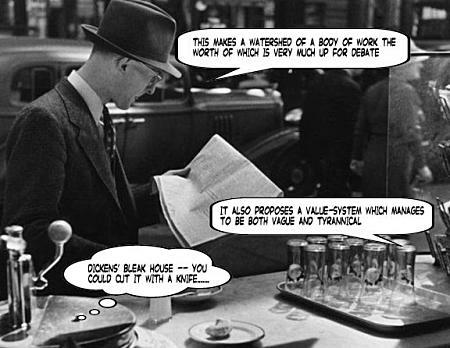
Breakfast comix 2
Doodles
Tom Raworth
_______________________
It’s sad what’s happened to the Republicans. They used to be the party of the big tent; now they’re the party of the sideshow attraction, a socially awkward group of mostly white people who speak a language only they understand. Like Trekkies, but paranoid.
- Bill Maher
via Doug Alder
_______________________
On Native Ground
The art of abidance and staying home
Joe Bageant
Because abidance in the form has been so continuous, it's hard to walk a few steps in any direction here without bumping into a reminder of previous abiders. Folks once here, but now gone. You remember its dead, and in doing so you have access to all they ever did that was right and all that was wrong -- what worked or did not work for those people and that community -- you know that. Even if you don't know you know it. In that way, places own us and we belong to places. A community with no memory of its dead is no real community, because it has no human connectivity grounded in time -- just interaction. It's merely a location populated by disassociate beings. A community's inherited memory from its dead provides its spiritual and moral animation, its posterity. Simply because we are humans, not aggregations of marketing or employment demographics, and are more than just a bunch of people who happen to be in the same place.
Not that most of us have a choice in the matter. We cannot escape most of what was already set in motion before our birth, such as being moved around by larger forces, for necessary employment, or alleged opportunity, or for "quality of life" as measured by consumption (a corporate yardstick if ever there was one). We find ourselves living in an unfamiliar land, ungrounded and psychically uncounseled by our ancestors through the living memory of a native community. Through deeper long term association with familiar people's lives and work, their grieving and their joy.
The solution to this void is simple, yet impossible to our minds. Stop moving. ...(more)
_______________________
A glimmer of hope?
The worst thing for the world economy would be to assume the worst is over
The Economist
... welcome as it is, optimism contains two traps, one obvious, the other more subtle. The obvious trap is that confidence proves misplaced—that the glimmers of hope are misinterpreted as the beginnings of a strong recovery when all they really show is that the rate of decline is slowing. The subtler trap, particularly for politicians, is that confidence and better news create ruinous complacency. Optimism is one thing, but hubris that the world economy is returning to normal could hinder recovery and block policies to protect against a further plunge into the depths.(....)
The worst is over only in the narrowest sense that the pace of global decline has peaked. Thanks to massive—and unsustainable—fiscal and monetary transfusions, output will eventually stabilise. But in many ways, darker days lie ahead. Despite the scale of the slump, no conventional recovery is in sight. Growth, when it comes, will be too feeble to stop unemployment rising and idle capacity swelling. And for years most of the world’s economies will depend on their governments.
Consider what that means. Much of the rich world will see jobless rates that reach double-digits, and then stay there. Deflation—a devastating disease in debt-laden economies—could set in as record economic slack pushes down prices and wages, particularly since headline inflation has already plunged thanks to sinking fuel costs. Public debt will soar because of weak growth, prolonged stimulus spending and the growing costs of cleaning up the financial mess. The OECD’s member countries began the crisis with debt stocks, on average, at 75% of GDP; by 2010 they will reach 100%. One analysis suggests persistent weakness could push the biggest economies’ debt ratios to 140% by 2014. Continuing joblessness, years of weak investment and higher public-debt burdens, in turn, will dent economies’ underlying potential. Although there is no sign that the world economy will return to its trend rate of growth any time soon, it is already clear that this speed limit will be lower than before the crisis hit.
Start preparing for the next decade
Welcome to an era of diminished expectations and continuing dangers; a world where policymakers must steer between the imminent threat of deflation while countering investors’ (reasonable) fears that swelling public debts and massive monetary easing could eventually lead to high inflation; an uncharted world where government borrowing reaches a scale not seen since the second world war, when capital controls ensured that savings stayed at home. ...(more)
_______________________
"When you've got big big banks -- Citicorp or Bank of America or Wells Fargo -- that control 70% of the banking system and all of them are weakening, you can't afford to have all those banks going under, even though the deposits might be guaranteed. We had to step in, it was the right thing to do, even though it's infuriating. ..."
"Same thing with AIG," Obama said. "It was the right thing to do to step in. Like they've got a bomb strapped to them and they've got their hand on the trigger, you don't want them to blow up, but you've got to ease them off the trigger."
-
Obama
quoted by Alain Wittman at Long Sunday
_______________________
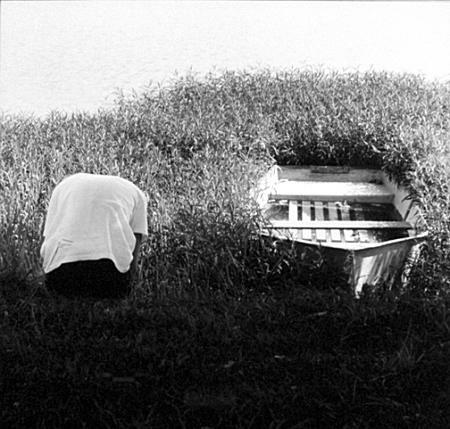
Ralph Eugene Meatyard
_______________________
What laughing chains the water wove and threw!
I learned to catch the trout's moon whisper; I
Drifted how many hours I never knew,
But, watching, saw that fleet young crescent die,---
And one star, swinging, take its place, alone,
Cupped in the larches of the mountain pass ---
Until, immortally, it bled into the dawn.
I left my sleek boat nibbling margin grass. . .
-
Hart Crane
(July 21, 1899 – April 27, 1932)
(from "The Dance"), The Bridge
_______________________
Coyote's Song: The Teaching Stories of Ursula K. Le Guin
Richard D. Erlich
A Science Fiction Research Association Digital Book
_______________________
Happy Birthday to me.

and
Walter Lantz
April 27, 1899 – March 22, 1994
_______________________
Forgetfulness
Forgetfulness is like a song
That, freed from beat and measure, wanders.
Forgetfulness is like a bird whose wings are reconciled,
Outspread and motionless, --
A bird that coasts the wind unwearyingly.
Forgetfulness is rain at night,
Or an old house in a forest, -- or a child.
Forgetfulness is white, -- white as a blasted tree,
And it may stun the sybil into prophecy,
Or bury the Gods.
I can remember much forgetfulness.
-
Hart Crane
_______________________

photo - mw
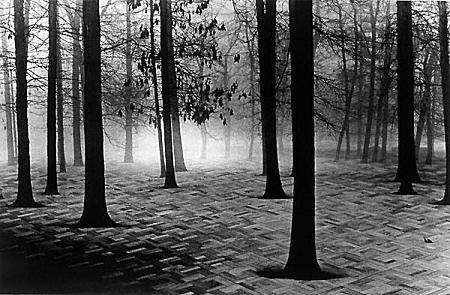
Scott Mutter: A More Perfect World
_______________________
from
The Edge of the Woods
Yves Bonnefoy
(....)
But I have no response: for words
Have something cruel about them, they refuse
Themselves to those who love and honor them
For what they might be, not for what they are.
And nothing stays with me but images,
Almost enigmas, which would turn
Your gaze away and leave it suddenly sad,
Your gaze, that takes in only what is clear.
You see, it's like a morning in the rain,
One goes to lift the water's hem
In order to risk plunging deeper than color
Into the unknown of pools and shadows.
_______________________
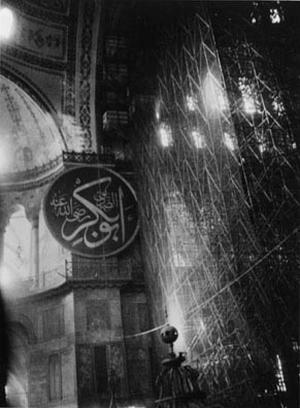 Hagia Sophia
Istanbul
Patti Smith: Veil
Robert Miller Gallery
gmtPlus9 (-15)
_______________________
The Wave
Orhan Veli
Translated by Murat Nemet-Nejat
To think myself happy
I don't need a piece of paper or a pen;
A cigarette dangling between my fingers
I enter the blue
Of the painting on the wall.
I enter it, the sea pulls me,
It pulls me, the world snares me;
Is there something like alcohol,
Alcohol in the air,
Making me mad, making me sad?
I can recognize a lie
When I see it;
It's a lie that I became a boat;
The coolness of water on my ribs
Is a lie,
The wind on the watchtower's a lie,
The motorboat which has been chugging along
For weeks...
Nevertheless,
I can still spend, still spend
Beautiful days
In this blue,
Like the watermelon rind swimming in the sea,
Like the reflection of the tree in the sky,
Like the fog which envelops the plum trees in the morning,
The fog, the mist, the love, the smells...
II.
Neither paper nor pencil
Can make me think myself happy.
I'll say it again,
This is nonsense
I'm not a ship.
I must be in a definite, definite
Place
Unlike the rind of watermelon
Or light or fog or mist...
Like a human being.
_______________________
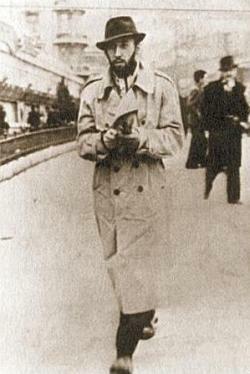
Orhan Veli
(April 13, 1914 – November 14, 1950)
Orhan Veli Kanik: Translating Clarity
Murat Nemet-Nejat
Orhan Veli was one of the creators of modern Turkish poetry in the 1940s. Before discussing his historical position, I must address the most common criticism of him, that he is trivial. That criticism reflects a certain attitude towards the anti-rhetoric of his poetry. Early critics attacked him for defacing the noble art of poetry. Even some later poets criticized him for being bourgeois, unconcerned with the great political issues of the time, comparing him unfavorably with his leftist contemporary, Nazim Hikmet. The fact is that while many significant poets get stale around the edges after a time, Veli remains fresh. One goes back to him over and over again.
To the extent that one grows to appreciate the experience of the body over rhetorical inflation, one grows to appreciate Orhan Veli. He is a poet of moment-to-moment experience, being in love, being bored, being sad, joking, casual musings. His poetic persona is designed to achieve this effect. His style is pared down to deal with a version of reality which is non-metaphysical, completely time-bound. In their delicate moments, his poems create the illusion that they are not poems, that they could be tosed of inadvertently by anybody. I think this quality is both the source of the main criticism against him and an indication of his main achievement....(more)
.....................................................
An Old Man
At the noisy end of the cafe, head bent
over the table, an old man sits alone,
a newspaper in front of him.
And in the miserable banality of old age
he thinks how little he enjoyed the years
when he had strength, eloquence, and looks.
He knows he's aged a lot: he sees it, feels it.
Yet it seems he was young just yesterday.
So brief an interval, so brief.
And he thinks of Prudence, how it fooled him,
how he always believed - what madness -
that cheat who said: "Tomorrow. You have plenty of time."
He remembers impulses bridled, the joy
he sacrificed. Every chance he lost
now mocks his senseless caution.
But so much thinking, so much remembering
makes the old man dizzy. He falls asleep,
his head resting on the cafe table.
Poems by Orhan Veli
Translated by Murat Nemet-Nejat
_______________________
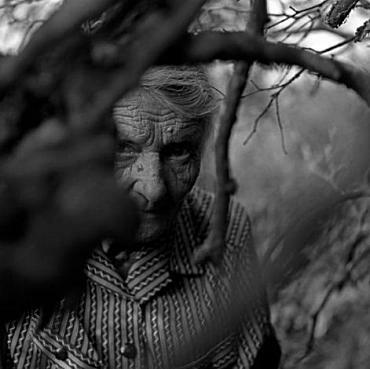
My aunt Juliette
Denis Dailleux
via Mrs. Deane
_______________________
The Next Great Discontinuity
Part One: Grapholectic Thought and the Fallacy of Misplaced Concreteness
Daniel Rourke
3quarksdaily
Part Two: The Data Deluge
Dances and stone circles relayed mythic thinking structures, singular, imminent and ethereal in their explanatory capacities. The truth revealed by the stone circle was present at the interface between participant, ceremony and summer solstice: a synchronic truth of absolute presence in the moment. Anyone reading this will find truth and meaning through grapholectic interface. Our thinking is linear, reductive and bound to the page. It is reliant on a diachronic temporality that the pen, the page and the book hold in stasis for us. Imitation alters the material world, which in turn affects the texture of further imitation. If we remove the process from its material interface we lose our objectivity. In doing so we isolate the single termite from its mound and, after much careful study, announce that we have reduced termite nature to its simplest constituent.
The reason for the tantalizing involutions here is obviously that intelligence is relentlessly reflexive, so that even the external tools that it uses to implement its workings become ‘internalized’, that is, part of its own reflexive process...
To say writing is artificial is not to condemn it but to praise it. Like other artificial creations and indeed more than any other, it is utterly invaluable and indeed essential for the realisation of fuller, interior, human potentials. Technologies are not mere exterior aids but also interior transformations of consciousness, and never more than when they affect the word.
-
Walter J. Ong, Orality and Literacy
Anyone reading this article cannot fail but be aware of the changing interface between eye and text that has taken place over the past two decades or so. New Media – everything from the internet database to the Blackberry – has fundamentally changed the way we connect with each other, but it has also altered the relationship we have with information itself. The linear, diachronic substance of the page and the book have given way to a dynamic textuality blurring the divide between authorship and readership, expert testament and the simple accumulation of experience. ...(more)
_______________________
Ragnarök
Jorge Luis Borges
parallel translation by Noah Hoffenberg
Exquisite Corpse
In dreams, writes Coleridge, images form the impressions that we believe them to trigger; we are not afraid because we're clutched by a sphinx, but rather a sphinx embodies the fear that we feel. If this is so, can a mere account of one's dream--shapes transmit the stupor, the elation, the false alarms, the menace, and the jubilation that is woven into last night's sleep? I will experiment with this account, without restraint; perhaps the fact that the dream was a single stream of consciousness expunges or mitigates this essential difficulty. (....)
Everyone began to suspect (perhaps excessively) that the Gods did not know how to speak. Centuries of life in exile, living like wild animals, had atrophied their once humanoid appearance; the Muslim moon and the Roman cross had been ruthless with these escapees. Low down Cro-Magnon brows, yellow teeth, meager Oriental mustachios, and beast-like lips obviously broadcasted the collapse of the lineage of Olympus. Their clothing didn't allude to decent decorous poverty, but of the garish luxury of gambling dens and brothels. In a buttonhole, a red carnation bled; we detected a dagger's outline beneath a tight-fitting coat. All of a sudden, we sensed that they were bluffing on their last card, that they were underhanded, dangerously ignorant, and cruel as aging predators, and that if we relented in fear or pity, they would destroy us.
We drew our heavy revolvers (the guns appeared immediately in the dream) and we happily slaughtered the Gods. ...(more)
_______________________

photo - mw
_______________________
from
The House Where I Was Born
Yves Bonnefoy
translated by John T. Naughton
V
In the same dream
I am lying in the hollow of a boat,
My forehead and eyes against the curved planks
Where I can hear the undercurrents
Striking the bottom of the boat.
All at once, the prow rises up,
And I think that we’ve come to the estuary,
But I keep my eyes against the wood
That smells of tar and glue.
Too vast, too luminous the images
That I have gathered in my sleep.
Why rediscover, outside,
The things that words tell me of,
But without convincing me,
I desire a higher or less somber shore.
And yet I give up this ground that stirs
Beneath the body waking to itself, I get up,
I go from room to room in the house,
They are endless now,
I can hear the cries of voices behind doors,
I am seized by these sorrows that knock
Against the ruined casings, I hurry on,
The lingering night is too heavy for me,
Frightened, I go into a room cluttered with desks,
Look, I’m told, this was your classroom,
See on the walls the first images you looked at,
Look, the tree, look, there, the yelping dog,
And the geography map on the yellow wall,
This fading of names and forms,
This effacing of mountains and rivers
By the whiteness that freezes language.
Look, this was your only book. The Isis of the plaster
On the wall of this room, which is pealing away,
Never had, nor ever will have anything other
To open for you, to close on you.
...(more)
New and Selected Poems
Yves Bonnefoy google books
In the Shadow's Light
Yves Bonnefoy
Translated by John Naughton
google books
Judith Bishop on Yves Bonnefoy
jacket _______________________
The World Digital Library (WDL)
UNESCO, Library of Congress and partners launch World Digital Library
_______________________
Europeana: think culture
links you to 4 million digital items
* Images - paintings, drawings, maps, photos and pictures of museum objects
* Texts - books, newspapers, letters, diaries and archival papers
* Sounds - music and spoken word from cylinders, tapes, discs and radio broadcasts
* Videos - films, newsreels and TV broadcasts
_______________________
 Today I'm off to Peterborough to see this guy
May be away for a few days.

Old Mill
Little Rock, Arkansas
Crystal K. D. Huie
Smithsonian
_______________________
Room
Laura Carter
post-dérives
Made plainer by some un-subjected thing, it's
almost morning and the crows are envious
of the utopian (x and y splayed
across) bed with the clock close beside.
Let's keep it here. Maybe it’s not a question
of address. Maybe it is. With every word
the "I" and "you" becoming separate beings.
I'll check the mail, open it with my hands.
Or maybe not. Maybe the lattice and ladder
tell a different story, and what's a ladder for if not
for our use, the "I" and "you" in the story,
the conditional tense held close.
...(more)
_______________________
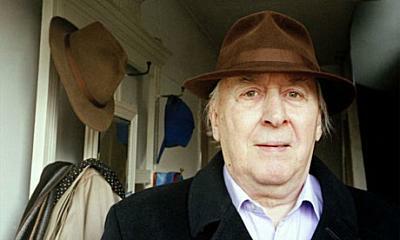
G Ballard
15 November 1930 - 19 April 2009
Photograph: Eamonn McCabe
_______________________
Who wears hats now?
Jenny Diski reviews Lost Worlds: What Have We Lost and Where Did It Go? by Michael Bywater
lrb
Now ought to be always like now, always, but the more time passes the more now seems to be a shadow of then. It makes some kind of sense. So much of then, so little of now, and ever decreasing quantities of to come. A progression of diminution with a tailback like the M25.
I know this happens to everyone (if they’re lucky) but if the young must always come of age as if no one has ever done it before, I can’t see why the old shouldn’t bang on their increasingly saggy drum about their astonishment at what is happening to them for the first time ever in history. Actually, what is happening for the first time ever in history is that it is my generation, the 1960s mob, which is ageing, and there never was such a generation for giving voice to their experience. So books moaning and bemoaning our lot have begun to appear. Fair enough, really, in the light of all those books by women who happen to have had their first baby and insist on sharing their amazing and unique experience with the rest of us.
Loss is the name of the ageing game. And loss is, after all, a big and sexy subject. Malleable, too: it can be as slight or profound as you like – it’s still loss, and therefore what we’re all about. Michael Bywater knows this. His Lost Worlds regrets the passing of Beans, Grandpa (‘My maternal grandfather is four ways lost. He is dead. He was a man of Monmouthshire. He was a steel man. He was an industrial craftsman. You don’t get much more lost than that’); Democracy (‘Democracy is the ultimately unarguable good . . . Do you have that straight in your mind? Or would you rather be . . . persuaded? Repeatedly? By dogs? Through a hood?’); Gloves (‘It is not elegant to have your gloves looped up through your coat-sleeves on elastic. Better to lose them altogether’); God (‘How wonderful God was when we first shuffled, thinking, onto the ancestral savannah! How clearly He had made the world, and made it for us, because he wanted us, and wanted us to be happy!’); University, the Idea of the (‘The idea that there may be a ravishing beauty in simply knowing – or better still, finding out – that Dr Donne’s horti conclusi and fons signati are from the Song of Songs is about as acceptable now as pederasty’); Septum, the Nasal (‘For countless millennia, the humble nasal septum was the must-have facial accessory . . . Then came cocaine’); Look-See, a Proper (‘You knew you had a proper doctor when he suggested opening you up for a proper look-see’); Ronco (‘The Veg-O-Matic, the Buttoneer, the Outside Inside Window Washer . . .’). After a while the relative weight of the alphabetically ordered losses is the same: heavy. The pang at being reminded of Mr Pastry, and then recollecting along with Bywater that he was crap but that we spent much of our childhood laughing like a drain at him, is quite as painful as recalling the lost Idea of America (‘our hope and our enchantment’) and knowing all the while that it never was and never really could have existed....(more)
_______________________
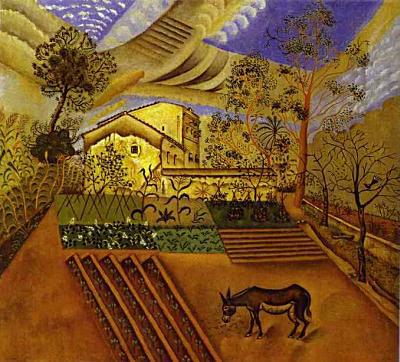
Vegetable Garden with Donkey
1918
Joan Miró
(April 20, 1893 – December 25, 1983)
_______________________
from
Sea of Hunger
Barbara Mor
ctheory
he knows he will awake one day find everything being removed in
bodybags. or there is no direction in the sea
because isnt this what it wants, to drown dissolve itself in the instant
ocean. immune boundaries permeate and destroy once and for all, DESIRE,
the plasm of One. the tube film neon eyes boombox beat it into yr
skin. one among many. torsos flanks gray naked shoulders and brain
revolving slowly northward through watery lanes, 20 100 1000 tides of
8 billion fish flesh needling into some punctured shore or border.
to just rest, surrender name identity account into the spreading stain
of the world. inside beyond a luxury to lie back become amoeba all over
the magnified body with no face. Tijuana and dawn. going north was not
going home. he was a spine inside a sea of evolving objects of dreams
but who had known there would be so much acute flesh. bones like knives
stuck out of doorways, ribs elbows pelvic shivs of revengeful hunger
bellies not soft, voluptuous, they were murderous. a conscious shark in the
thick sea. so many nostrils gullets anuses body holes without distinction
sex dinner and murder as the same act. where you cross the borders of
Distance, where bodies go in and out of each other
that all civilizations are only different positions in the sexual act
of one giant melticellular organism continuously fucking feeding
reproducing consuming excreting itself. cf that Frenchmans
pseudopods
waste and redundance. the great feast
workers rapists slaves abandoned babies the pope the pentagon the
presidents twat a ring of children dancing in a park who just
disappear
so what did they want of him. they would send him to school.
of what. fish?
but can you feel no sorrow for the world
but all this is for the american guest.
his intentions as always are only good
he crosses thresholds to eat, consume hunger. returns followed by
starvation and appetite. export and import. supply and demand. demand
and demand. germs dope seeds women children microcosms sanddollars
biochips electric shoes spleens cameras toxic lotteries mudslides
theres a job, at this party, for a caterer. one who feeds needs to eat
need not be eaten. who did sharks? orcas, the sea itself. nothing small.
his mind enjoyed playing with metaphors but the fact was, glancing at
day coming in the windows, he was young cleareyed useful and very clean
when shaven. corruption in the beholders eye, he could see none. this
is the genius of the american face. you learn in a sea of foreign eyes who
see necessary evil day and night in each other, it is their fact of life.
...(more)
_______________________
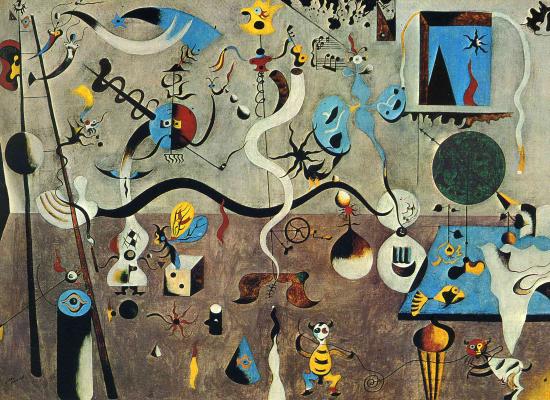
Harlequin's Carnival
Joan Miró
1924-25

Critical Gaze
Luis Gonz?lez Palma
1 2 3
featured in Visura Magazine, Issue 2
The Postmodern Romantic
An Interview with Luis Gonz?lez Palma
Light and darkness, song and scream,
the photographic work of Luis Gonz?les Palma
By Fernando Castro R.
_______________________
Dictionary of Non-Philosophy [pdf]
Fran?ois Laruelle
translations by Taylor Adkins
Democracy (Democracy-of-Strangers)
Internal form of non-philosophical thought as unified theory of philosophy and a particular region. Here democracy is not an object of thought or reflection but the essence of knowledges produced by the force (of) thought or in-the-last-instance by the vision-in-One which assures against the transcendental equality of unified terms against every form of hierarchy. Nonphilosophy is a transcendental theory of human multitudes in a manner through which humans of-the-last-instance are em-bodied [en-corps], but it takes for material philosophical inequality in general and in particular the ego-xenological Difference typical of philosophy.
The philosophical Decision, when it studies politics and more particularly democracy, poses the question of the relation established between individuals, but on the grounds of the World or the City, and as belonging to the World. This relation signals the reciprocity among parties and the appearance of equality bound to reciprocity. Thus, historically speaking, modern democracy is imposed by the idea of a social contract (Rousseau). In general, the problem of democracy is tied to that of the management of contractual and intersubjective situations. Certainly, the structure of the problem will be different according to whether one proceeds from Greco-European being-in-the-world (Heidegger) or from the “Most-High” (Levinas) of the Other. The democratic question of the contract, and which is more of a social bond, can be complexified into that of a communicational action (Habermas), that of grand anti-nihilistic politics (Nietzsche), or that of a political overdetermination of the last instance (Althusser). But in every philosophical scenario, equality through reciprocity or difference implies philosophical hierarchy as the most “abstract” equality subtending the spirit of inequality proper to philosophy. Philosophy, or the “thought-world,” is an objective democratic appearance and a real anti-democracy.
The philosophers’ political thought mimics human struggles and thus can only explain them. The problem of a philosophy of democracy no longer makes rigorous human sense. A mode of nonhierarchized and non-anarchic democracy presupposes a unilateral duality: I…am (and not “is”), thus I am an Other, a democratic multitude, a Stranger. The Stranger is not the Other encountered in the space of the World or as Infinite, but myself in-the-last-instance. This is the transcendental organon of the World and the absolute condition of democracy.
The Stranger “makes” the void; it transcendentally anesthetizes every type of conditioning (psychological, sociological). The void is also fully positive, as identity of universal law, which is itself in the flesh. The content of this void is precisely a transcendental multitude, a nonautopositional democracy. Completely understood, democracy, which neither acts on the logological center nor on the margins or inequalities, destabilizes and utilizes authoritarian autopositions henceforth made secondary. The theoretico-pragmatic human-in-the-last-instance is substituted for the violence of the democratic State and its philosophical expression.
via Speculative Heresy
_______________________
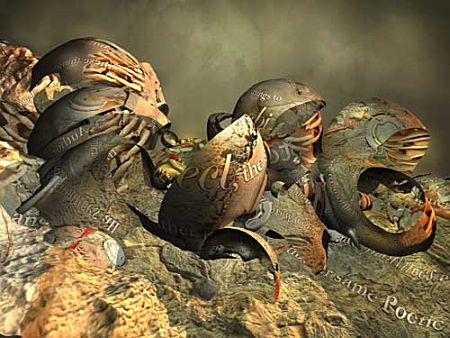
The Disremembered Glossolalist
Peter Ciccariello
L I M I N A L - S P A C E S
Ephemeral Photography by Peter Ciccariello
Hope Street
Poems from Providence - Peter Ciccariello
_______________________
A Ritual To Read To Each Other
William Stafford
If you don't know the kind of person I am
and I don't know the kind of person you are
a pattern that others made may prevail in the world
and following the wrong god home we may miss our star.
For there is many a small betrayal in the mind,
a shrug that lets the fragile sequence break
sending with shouts the horrible errors of childhood
storming out to play through the broken dyke.
And as elephants parade holding each elephant's tail,
but if one wanders the circus won't find the park,
I call it cruel and maybe the root of all cruelty
to know what occurs but not recognize the fact.
And so I appeal to a voice, to something shadowy,
a remote important region in all who talk:
though we could fool each other, we should consider--
lest the parade of our mutual life get lost in the dark.
For it is important that awake people be awake,
or a breaking line may discourage them back to sleep;
the signals we give--yes or no, or maybe--
should be clear: the darkness around us is deep
_______________________

Shelby Lee Adams
1 2
featured in Visura Magazine, Issue 2
_______________________
Of course at the foundation of the state there was a tremendous sense of purpose, of building something together. But we squandered our chance to make the state permanent in 1967. Instead of using the conquered territories as leverage in negotiation, instead we became addicted to occupation. When a people have suffered as much as we have it's not a bad feeling to be masters for once. And we became addicted to that feeling, like a narcotic.
Now we have terrible trouble imagining any other reality than the one we live in. You become habituated, you cannot believe there is another possible way of life. And so effectively you become a victim of the situation. And here, again, is the central paradox, the idea of Israel was that we should cease to be victims. Instead we hand our fate over to the security people, we allow the army to run the country, because we lack a political class with a vision beyond the military. Survival becomes our only aim. We are living in order to survive, not in order to live.
I want to begin to live. I want some gates in the wall.
Wall: A Monologue
David Hare
Not just a wall. A wall would be a fact. But this wall is a philosophy, what one observer has called "a political code for shutting up shop."...(more)
_______________________
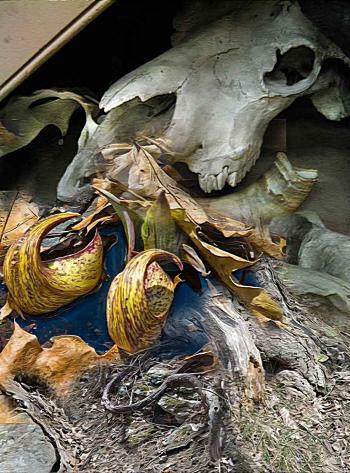
the stirring
Peter Ciccariello
invisible notes
_______________________
Journal of the Northern Renaissance
Periodization, Modernity, Nation: Benjamin Between Renaissance And Baroque
Jane O. Newman
http://www.northernrenaissance.org/articles/Periodization-Modernity-Nation-Benjamin-Between-Renaissance-and-BaroquebrJane-O-Newman/9
Herder’s claim already more than two hundred years ago that the history of the Baroque was ‘obscure’ (the German reads: ‘im Dunkeln’, in the dark) is just as appropriate in our early twenty-first century as it was in his day, this in spite of the enormous amount of attention devoted by literary, art historical, and art theoretical scholars to both the period (c. 1550-1700) and its styles in the intervening years. Walter Benjamin was one of those engaged in the debates about the Baroque that were conducted with particular intensity beginning in the last decades of the nineteenth century and on into the early part of the twentieth century. The period and the concept are in fact at the centre of his (in)famously obscure The Origin of the German Tragic Drama (1928), which Benjamin often referred to as his ‘Barockbuch’, as, for example, in a letter to Gershom Scholem of 19 February, 1925 (Benjamin 1993: I, 374). Debates about the Baroque spread from the German-speaking countries of central Europe into the United States along with many of the European émigrés who found their new academic homes and livelihoods there during and after World War II. (Benjamin was of course not among them, having taken his own life in 1940 as he fled the Gestapo.) In their new home, these debates flowered in both explicit and implicit dialogue with the heavily ideological celebrations of the value of studying the Renaissance in the Cold War ‘New World’, celebrations also conducted by immigrant scholars with the help of ‘indigenous’ colleagues familiar with the landscape of pre- and inter-war European academe (Newman 2006). The Baroque nevertheless disappeared from the scene quite abruptly beginning in the mid- to late 1970s. Ever since, Renaissance and Early Modern Studies, often seen as antithetical to one another (Marcus 1992), have joined forces to jostle it aside. Because these latter terms are the ones that dominate the complex politics of period nomenclature that organize much academic discourse about the study of the late fifteenth through the early seventeenth centuries today, it is worth revisiting both the chronology and the substance of their rise to a position of dominance in their original context and then considering the role of ‘northern Renaissance Studies’ in our post- or (perhaps somewhat differently configured) neo-Cold War world, depending on where one stands. To what end do we still study the Renaissance and Early Modern (rather than the Baroque) today? What are the assumptions and consequences of doing so as a matter of place? ...(more)
via RiZoMa _______________________
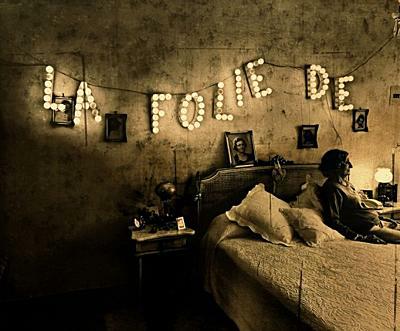
strategy that unites us
Luis Gonz?lez Palma
_______________________
My melancholy watch, mid-quarter-deck,
Drifting: I follow the play of gulls.
The sun is long gone down, the east darkling,
The ship drifts. In the west, some brightness remains.
Momently there are two flights of gulls moving
One to the east into the dark and one
Out of the west, in the last rays of the sun,
Left and right so entirely dissimilar
That the name gull quite falls from them
As I watch, and the chiaroscuro
Of the evening is torn open, altering
Everything: so that now everything is
Only itself: the gulls, myself closer
In nature than if I still knew their name,
Yet at the same time moving farther out,
Sinking deeper into a fading sky
Which soaks them up like ink accepting water,
Coaxing darkness out of reluctant night,
Bringing on the abolition of that false
Identity which made naming possible.
Tom Clark, from Junkets on a Sad Planet: Scenes from the Life of John Keats
Junkets on a sad planet: scenes from the life of John Keats
Tom Clark
Junkets on a Sad Planet: Scenes from the Life of John Keats
Tom Clark
amazon
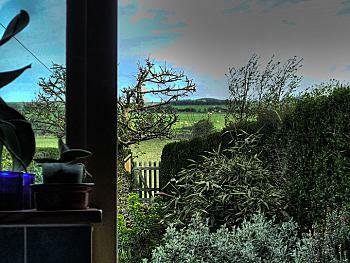
Morning Storm
photo by Tom Raworth via Tom Clark
_______________________
Tracking (notes)
Tom Raworth
from Tottering State
light (drugs as only altering positions of piles of chemicals).
light as feeling? i.e. pulse waves(what happens to things
moving away faster than the speed of light? does light die
out?). Jesus, Shakespeare, Hitler, etc. (political waves?) going
out from planet like heart beats.
light. dream being the mixed waves of feeling from other
'mind' sources during darkness our consciousness(un is not
sub) due to nearness of clear light source (reflected light or
what? mirrors?). day night: artificial light destroys balance
(midnight sun?).
...(more)
Tom Raworth at the Electronic Poetry Center
a festschrift for Tom Raworth
jacket
Raworth at the Poetry Archive
Tom Raworth at PennSound Tom Raworth's Collected Poems reviewed [pdf] by Marjorie Perloff
_______________________
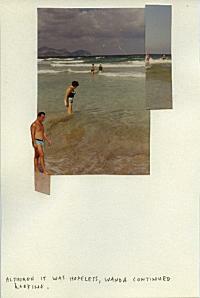
Wanda
found photographs and graphite
April Gertler PHOTO-BASED
Barbara Archer Gallery via gmtPlus9 (-15)
_______________________
Write all the same, in spite of despair. No: with despair. I don't know what to call that despair. Writing to one side of what precedes writing is always to ruin it. And yet we must accept this: ruining the failure means coming back toward another book, toward another possibility of the same book.
- Marguerite Duras, from Writing
part of a longer quote provided by Spurious
_______________________
A Surprising Tale in the Form of an Alphabet
Bernardo Atxaga
Translated from the Spanish by Margaret Jull Costa
words without borders
They say that the monks of eight or nine hundred centuries ago often had to face unenthusiastic, occasionally hostile audiences, who were most reluctant to follow the steps of a theological proof or of a moral sermon, and that the Alphabeta exemplorum was born out of that difficulty and the need to overcome it. What the monks did was to share out the weight of the discourse equally, so that each of the twenty or so letters of the corresponding alphabet would bear some of that weight on its tiny shoulders and help to carry the load; for example, A might be used to demonstrate the existence of the Afterlife, B would speak of St. Basil, and C would summarize the arguments of its two fellows and offer a first Conclusion. In short, all the other letters—with the possible Exception of the E—would do the same, and the audience would arrive at Z with their minds fully focused on all those ideas, which seemed to advance as if by leaps.
When one of those Alphabeta exemplorum first fell into my hands, I immediately saw the point of that verbal contrivance, having already spent quite long enough facing unenthusiastic, occasionally hostile audiences, who were most reluctant to follow the steps of my faltering literary and political proofs. I did not hesitate ......(more)
Words Without Borders
PEN World Voices Festival launches its fifth annual celebration of global literature at the end of this month, and we’re kicking off the party with a sampler of new writing from a selection of the participants.
_______________________
Pluriverse
Ernesto Cardenal
reviewed by Vincent Francone
Cardenal always keeps his eye fixed firmly to his subject, even when bouncing from place to place, as in his “Trip to New York,” a poem that offers North Americans a look at a foreigner’s view of our rampant capitalism:
. . . And I look
at the deep canyon, the sunken gorge of buildings
where the hidden persuaders hide behind their windows
selling automobiles of True Happiness, canned Relief (for 30¢)
** The Coca-Cola Company**
we cut through the canyon of windows and trillions of dollars
A seller of old books in the Village in love with my shirt
my cotton peasant shirt from Nicaragua
he asks me who designed it.
Reading Pluriverse from cover to cover is, in effect, charting Cardenal from his beginnings to his current, Cosmic Canticle era writings—poems that chart the progression of the universe, the Earth, and the individual all at once. ...(more)
_______________________
The Quiet Coup
Simon Johnson
atlantic
... the U.S. is unique. And just as we have the world’s most advanced economy, military, and technology, we also have its most advanced oligarchy....(more)
_______________________
Thought Control and 'Professional' Journalism - part 1 part 2
Media Lens
via Thivai Abhor
_______________________
The Weapons That Kill Civilians
Deaths of Children and Noncombatants in Iraq, 2003–2008
New England Journal of Medicine
_______________________
Zimbardo on Milgram and Obedience - Part II
Philip Zimbardo from his preface to a new edition of Stanley Milgram's Obedience to Authority
Situationist
A few words about how I view this body of research. First, it is the most representative and generalizable research in social psychology or social sciences due to his large sample size, systematic variations, use of a diverse body of ordinary people from two small towns—New Haven and Bridgeport, Connecticut—and detailed presentation of methodological features. Further, its replications across many cultures and time periods reveal its robust effectiveness.
As the most significant demonstration of the power of social situations to influence human behavior, Milgram’s experiments are at the core of the situationist view of behavioral determinants. It is a study of the failure of most people to resist unjust authority when commands no longer make sense given the seemingly reasonable stated intentions of the just authority who began the study. It makes sense that psychological researchers would care about the judicious use of punishment as a means to improve learning and memory. However, it makes no sense to continue to administer increasingly painful shocks to one’s learner after he insists on quitting, complains of a heart condition, and then, after 330 volts, stops responding at all. How could you be helping improve his memory when he was unconscious or worse? The most minimal exercise of critical thinking at that stage in the series should have resulted in virtually everyone refusing to go on, disobeying this now heartlessly unjust authority. To the contrary, most who had gone that far were trapped in what Milgram calls the “agentic state.”
These ordinary adults were reduced to mindless obedient school children who do not know how to exit from a most unpleasant situation until teacher gives them permission to do so. At that critical juncture when their shocks might have caused a serious medical problem, did any of them simply get out of their chairs and go into the next room to check on the victim? Before answering, consider the next question, which I posed directly to Stanley Milgram: “After the final 450 volt switch was thrown, how many of the participant-teachers spontaneously got out of their seats and went to inquire about the condition of their learner?” Milgram’s answer: “Not one, not ever!” So there is a continuity into adulthood of that grade-school mentality of obedience to those primitive rules of doing nothing until the teacher-authority allows it, permits it, and orders it.
My research on situational power (the Stanford Prison Experiment) complements that of Milgram in several ways. They are the bookends of situationism: his representing direct power of authority on individuals, mine representing institutional indirect power over all those within its power domain....(more)
Part I
_______________________

The Still Water
Gertrude Käsebier
1904
_______________________
A universe harmonious as a harp.
Rhythm is repeated equal times.
Heartbeat.
Day/night.
Migrant birds' arrivals and departures.
Star cycles and maize cycles.
Mimosa opening during the day
and folding when night comes.
Moon and tide rhythms.
And crabs who know the tide is on the ebb
and before it goes out have their hiding holes.
A single rhythm in planets, the sea, atoms, apples
which ripen and fall, and Newton's head.
Melody, arpeggio, chord.
The harp of the universe.
that is music.
Difference between music and noise...
The bell's sound is in its form.
Or girls' legs, come to that.
Matter is music.
Matter in perpetual motion in space and time.
Rhythmical are hearts and stars.
The universe sings and Pythagoras heard it.
The music of the spheres,
rather than classical music, jazz.
-
from The Music of the Spheres, Ernesto Cardenal
_______________________

Upstream
First Light
Tom Raworth
flickr Tom Raworth's homepage
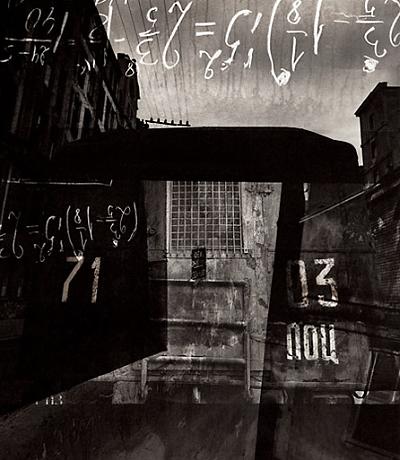
Nomenclatura of signs
Alexey Titarenko
_______________________
Broom
Deborah Digges
from Rough Music
(....)
Once I asked myself, when was I happy?
I was looking at a February sky.
When did the light hold me and I didn't struggle?
And it came to me, an image
of myself in a doorway, a broom in my hand,
sweeping out beach sand, salt, soot,
pollen and pine needles, the last December leaves,
and mud wasps, moths, flies crushed to wafers,
and spring's first seed husks,
and then the final tufts like down, and red bud petals
like autumn leaves--so many petals--
...(more)

Deborah Digges
1950 – 2009
Rune for the Parable of Despair
Deborah Digges
Little left of me that year—I had a vision
I was strata, atmosphere.
Or it was that the host entire coded in my blood
found voice and shrieked, for instance,
at what we now call roads
and I must maneuver freeways, bridges with these inside me
falling to their knees beating the ground howling.
One might well ask why they’d come forward—
fugitives flushed from a burning house,
converts fed down the aisles,
bumping and blubbering their way into revival light,
light so eroding, the human face is abberation,
the upright stance a freak
with no means otherwise.
Some things won’t translate backwards.
Some things can’t be undone,
though it takes years to learn this, years.
Such were the serial exhaustions of my beliefs,
whatever drug worn off that must belong to youth,
or to the feminine, or simply to the genes begun a wintering.
Then I knew the purest bitterness,
as if my heart were a wrecking ball,
my love for the man an iron bell used of the wind,
calling to task a population,
calling them in, as from these fields,
before the stone wheel became speech,
before fire dropped from the sky to be caged and carried into the caves.
And so they came to be with me,
...(more)
Deborah Digges at the Poetry Foundation
_______________________
 The Plow and the Song
Arshile Gorky
1904 - 1948
_______________________
Modernity: Critiques of Visual Culture
volumes 1 - 4
_______________________
European Political Science Review
Vol. 1 Iss. 01
_______________________
Ahorn
an online magazine dedicated to contemporary photography, directed and edited by Daniel Augschoell and Anya Jasbar.
via The Exposure Project
_______________________
 Urban Renewal
Cleveland
Godfrey Frankel
1895-1964
1 2 3
_______________________
The Red Cross Torture Report: What It Means
Mark Danner
When it comes to torture, it is not what we did but what we are doing. It is not what happened but what is happening and what will happen. In our politics, torture is not about whether or not our polity can "let the past be past"—whether or not we can "get beyond it and look forward." Torture, for Dick Cheney and for President Bush and a significant portion of the American people, is more than a repugnant series of "procedures" applied to a few hundred prisoners in American custody during the last half-dozen or so years—procedures that are described with chilling and patient particularity in this authoritative report by the International Committee of the Red Cross. Torture is more than the specific techniques—the forced nudity, sleep deprivation, long-term standing, and suffocation by water," among others—that were applied to those fourteen "high-value detainees" and likely many more at the "black site" prisons secretly maintained by the CIA on three continents.
...(more)
_______________________
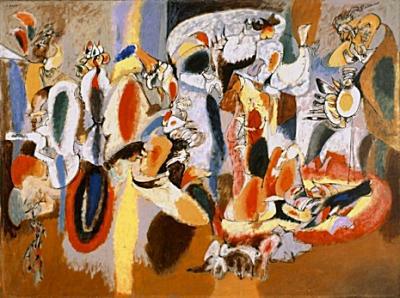
The Liver Is the Cock's Comb
Arshile Gorky
1944
_______________________
Can America Fail?
Kishore Mahbubani
In 1981, Singapore’s long-ruling People’s Action Party was shocked when it suffered its first defeat at the polls in many years, even though the contest was in a single constituency. I asked Dr. Goh Keng Swee, one of Singapore’s three founding fathers and the architect of its economic miracle, why the PAP lost. He replied, “Kishore, we failed because we did not even conceive of the possibility of failure.”
The simple thesis of this essay is that American society could also fail if it does not force itself to conceive of failure. The massive crises that American society is experiencing now are partly the product of just such a blindness to potential catastrophe. That is not a diagnosis I deliver with rancor. Nations, like individuals, languish when they only have uncritical lovers or unloving critics. I consider myself a loving critic of the United States, a critic who wants American society to succeed. America, I wrote in 2005 in Beyond the Age of Innocence: Rebuilding Trust Between America and the World, “has done more good for the rest of the world than any other society.” If the United States fails, the world will suffer too.
The first systemic failure America has suffered is groupthink. ...(more)
_______________________
Poetry as Revolutionary Praxis:
Philip Lamantia & the Surrealist Movement in the United States
Franklin Rosemont
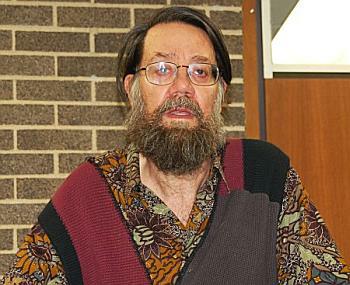
Franklin Rosemont
1943 - 2009
Surrealist poet, labor historian
photo - Thomas Good
... between the history he himself helped create and the history he helped uncover, Franklin was never without a story to tell or a book to write—about the IWW, SDS, Hobohemia in Chicago, the Rebel Worker, about the past 100 years or so of radical publishing in the US, or about the international network of Surrealists who seemed to always be passing through the Rosemonts’ Rogers Park home. As engaged with and excited by new surrealist and radical endeavors as he was with historical ones, Franklin was always at work responding to queries from a new generation of radicals and surrealists, and was a generous and rigorous interlocutor. In every new project, every revolt against misery, with which he came into contact, Franklin recognized the glimmers of the free and unfettered imagination, and lent his own boundless creativity to each and every struggle around him, inspiring, sustaining, and teaching the next generation of surrealists worldwide.
-
Kate Khatib
In Memoriam: Franklin RosemontDeath of a Surrealist: Franklin Rosemont, R.I.P. Max Ernst and Alchemy: A Magician in Search of Myth
M. E. Warlick, Franklin Rosemont
google books
_______________________

Modern Times
Charlie Chaplin
16 April 1889
_______________________
My Life's Calling
Deborah Digges
My life's calling, setting fires.
Here in a hearth so huge
I can stand inside and shove
the wood around with my
bare hands while church bells
deal the hours down through
the chimney. No more
woodcutter, creel for the fire
or architect, the five staves
pitched like rifles over stone.
But to be mistro-elemental.
The flute of clay playing
my breath that riles the flames,
the fire risen to such dreaming
sung once from landlords' attics.
Sung once the broken lyres,
seasoned and green.
Even the few things I might save,
my mother's letters,
locks of my children's hair
here handed over like the keys
to a foreclosure, my robes
remanded, and furniture
dragged out into the yard,
my bedsheets hoisted up the pine,
whereby the house sets sail.
And I am standing on a cliff
above the sea, a paper light,
a lantern. No longer mine
to count the wrecks.
Who rode the ships in ringing,
marrying rock the waters
storm to break the door,
looked through the fire, beheld
a clearing there. This is what
you are. What you've come to.
|
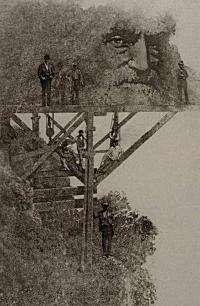
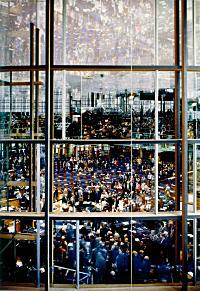
 Janus Head
Janus Head
 The Age of Briggs & Stratton
The Age of Briggs & Stratton












































